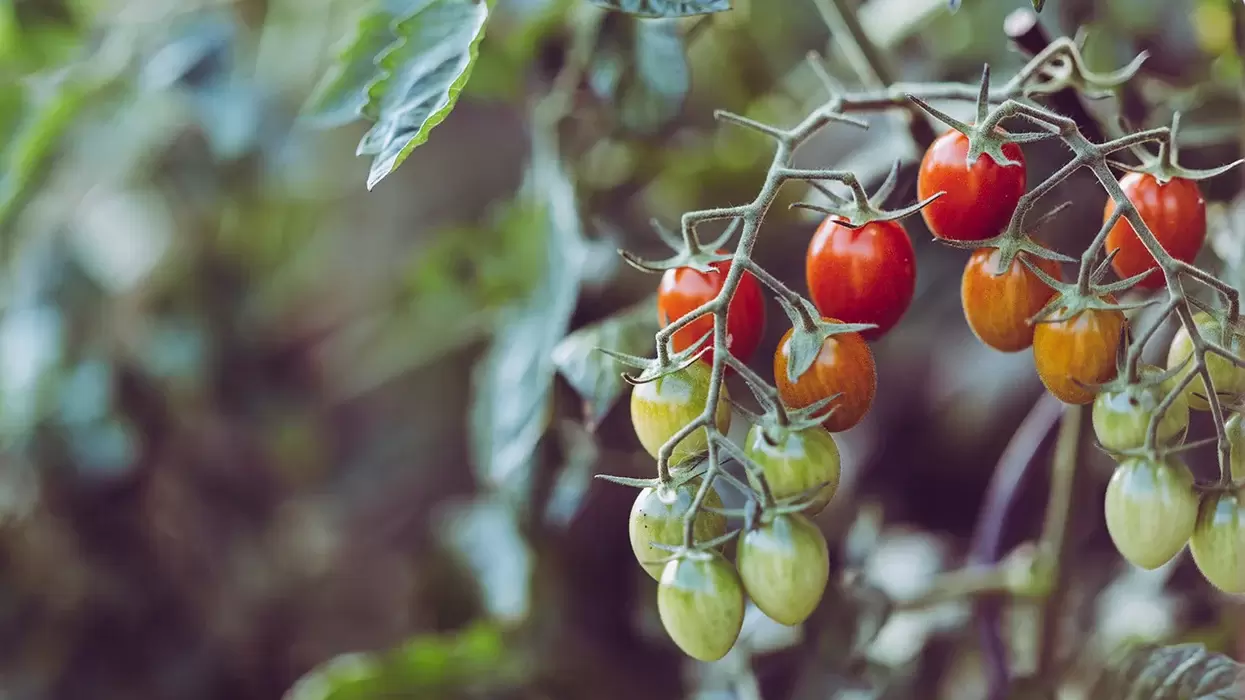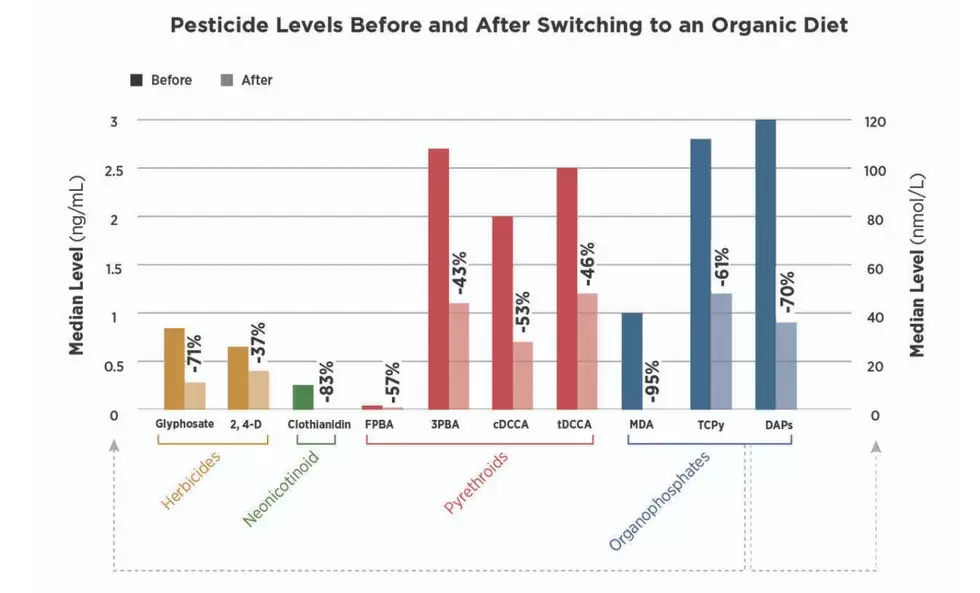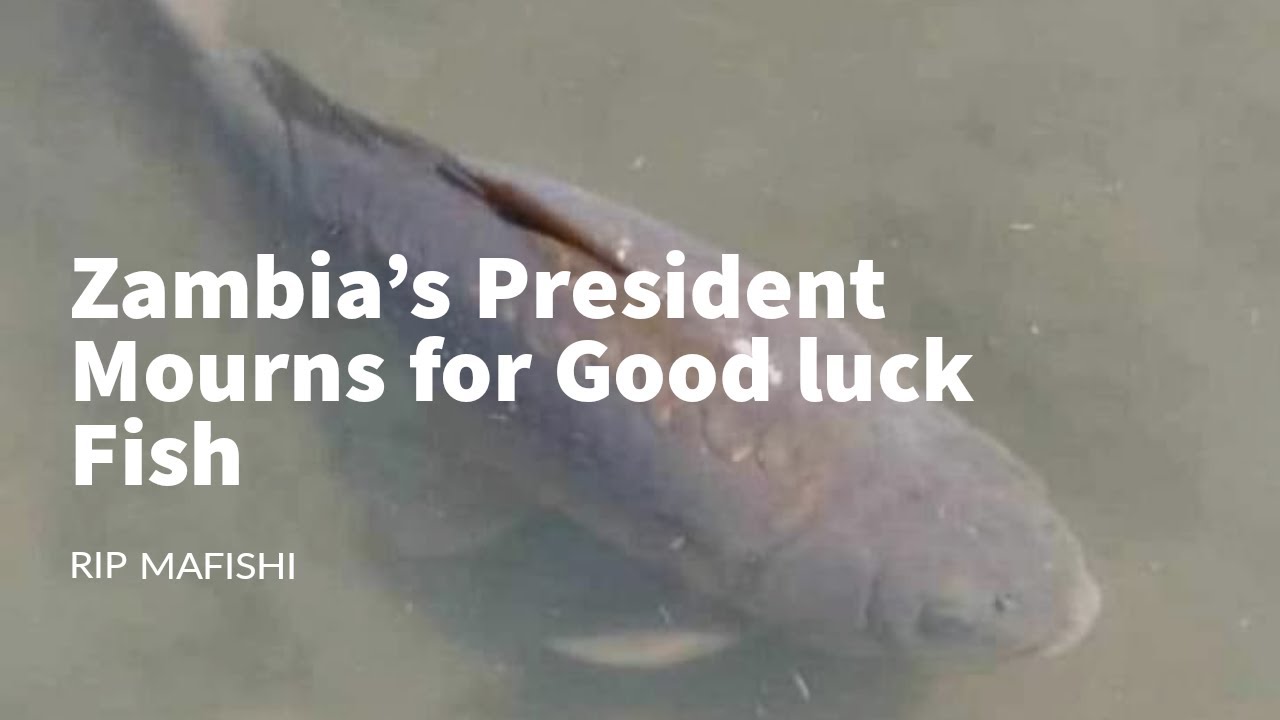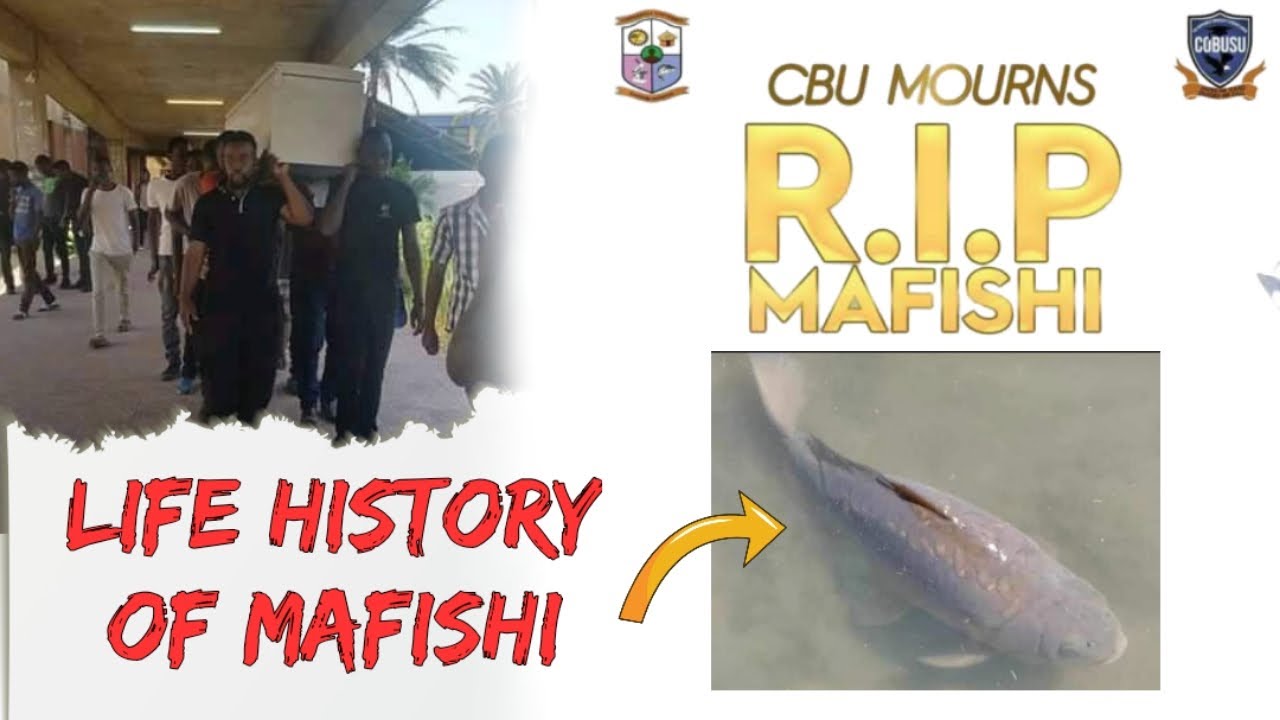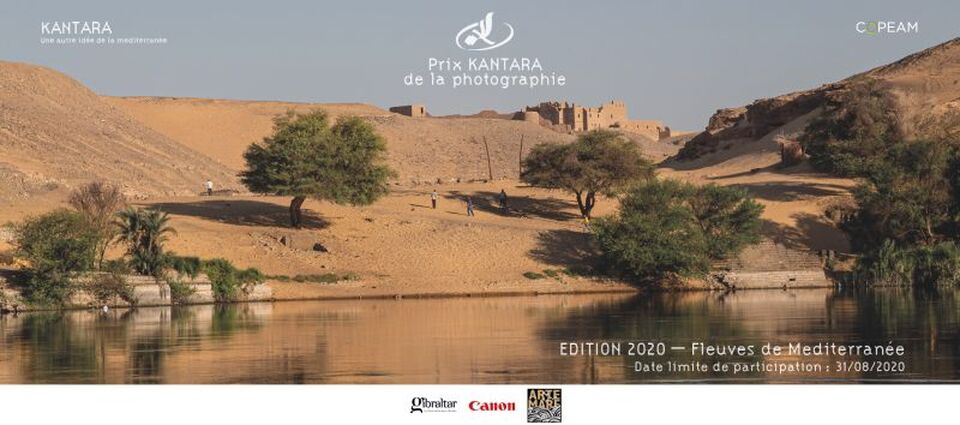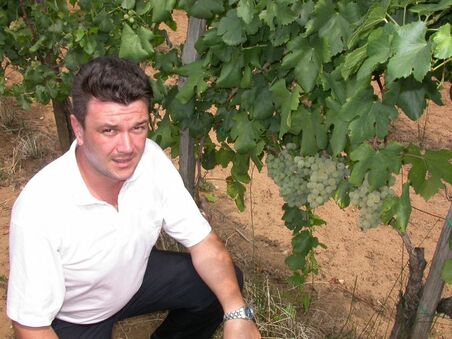|
Organic Farming Protects Communities from Toxic Chemicals
Most people who buy organic do it because they want to eat healthier. It's true – switching to an organic diet rapidly decreases exposure to a wide range of pesticides, including glyphosate (the main ingredient in Roundup). According to a new study ublished in Environmental Research, glyphosate levels in families' bodies dropped 70% in just one week on an organic diet. The researchers concluded that diet is a major source of glyphosate exposure and that eating organic reduces exposure. |
But the health benefits of organic agriculture extend far beyond our individual dinner plates. Organic farming offers a comprehensive alternative to chemical agriculture, and it protects our soil, air, water, wildlife, and critically – our farming communities – from toxic pesticides.
The purpose of pesticides is to kill. So it's not surprising that widespread use of these chemicals poses a serious public health threat. Diet alone exposes us to a frightening cocktail of pesticide residues, and toxic pesticides pose much more severe health threats to farming communities.
The purpose of pesticides is to kill. So it's not surprising that widespread use of these chemicals poses a serious public health threat. Diet alone exposes us to a frightening cocktail of pesticide residues, and toxic pesticides pose much more severe health threats to farming communities.
Food system workers and their families and communities – who are disproportionately Latinx and low-income – bear the brunt of harm from toxic pesticide use in agriculture. Farmworkers are at risk from direct exposure to harmful chemicals when mixing and applying pesticides, as well as while working in fields; as a result, they suffer more chemical-related injuries than any other U.S. workforce. Exposure also extends beyond the workplace. Workers can carry pesticides home on clothes, shoes, and skin, inadvertently exposing their children and other family members, and pesticide drift can harm people living, working, and learning near farms.
These exposure routes add up. And weaning our agricultural system off its addiction to toxic chemicals is an uphill battle.
We've seen recent wins on pesticide issues in the courts and in some states, but it can take decades of fighting to end the use of a single pesticide. For example, NRDC petitioned the federal Environmental Protection Agency (EPA) to end use of the brain-toxic pesticide chlorpyrifos in 2007; thirteen years later, we're still in court demanding that EPA protect public health. Meanwhile numerous similar organophosphate chemicals also remain in our fields and our bodies.
This pesticide "whack-a-mole" problem makes organic farming a potent addition to our public health toolbox, especially in farming communities: organic farmers do no use most synthetic pesticides, so organic farming eliminates a wide range of health threats posed by farming with toxic chemicals.
The health crises facing farm workers and rural communities needs urgent attention, particularly in light of the added burdens from the COVID-19 crisis. Kendra Klein and Anna Lappé got it right.
"As long as we treat organic food as if it's a shopping preference instead of a public good, we will miss the opportunity to fight for a desperately needed shift in how we farm."
We should all be able to eat without exposing anyone to toxic pesticides. That's why we support more public investment in organic in schools, , in the Farm Bill, in climate policy and beyond. The stakes are high – but the solutions are within reach.
By Allison Johnson, Sustainable Food Policy Advocate at the Natural Resources Defense Council , 16th August 2020
These exposure routes add up. And weaning our agricultural system off its addiction to toxic chemicals is an uphill battle.
We've seen recent wins on pesticide issues in the courts and in some states, but it can take decades of fighting to end the use of a single pesticide. For example, NRDC petitioned the federal Environmental Protection Agency (EPA) to end use of the brain-toxic pesticide chlorpyrifos in 2007; thirteen years later, we're still in court demanding that EPA protect public health. Meanwhile numerous similar organophosphate chemicals also remain in our fields and our bodies.
This pesticide "whack-a-mole" problem makes organic farming a potent addition to our public health toolbox, especially in farming communities: organic farmers do no use most synthetic pesticides, so organic farming eliminates a wide range of health threats posed by farming with toxic chemicals.
The health crises facing farm workers and rural communities needs urgent attention, particularly in light of the added burdens from the COVID-19 crisis. Kendra Klein and Anna Lappé got it right.
"As long as we treat organic food as if it's a shopping preference instead of a public good, we will miss the opportunity to fight for a desperately needed shift in how we farm."
We should all be able to eat without exposing anyone to toxic pesticides. That's why we support more public investment in organic in schools, , in the Farm Bill, in climate policy and beyond. The stakes are high – but the solutions are within reach.
By Allison Johnson, Sustainable Food Policy Advocate at the Natural Resources Defense Council , 16th August 2020
|
Zambia's president mourns death of good-luck fish (9th September 2020)
Zambia's President Edgar Lungu has joined the nation in mourning the death of a fish that lived in a pond at the country's second-biggest university. Students at Copperbelt University (CBU) lit candles and marched around campus to mourn the big fish. The hashtag Mafishi, as the fish was affectionately known, is trending on Twitter in the southern African state. For the past two decades CBU students have believed the fish would bring them good luck in exams. Mafishi, meaning "Big Fish" in the local Bemba language, was thought to be at least 22 years old and had lived in the university's pond for more than 20 years, student leader Lawrence Kasonde said. His death was still being investigated, added the president of the Copperbelt University Student's Union. "It is yet to be buried, we are planning on embalming it," Mr Kasonde told the BBC. Some students used to pay homage to the fish before exams, believing it brought them good luck while others saw it as a stress-reliever, says BBC Zambia reporter Kennedy Gondwe. |
KANTARA second edition of its Photography Prize
Kantara - the weekly radio magazine in French co-produced by 7 Mediterranean public radios under the aegis of COPEAM, launches the second edition of its Photography Prize. Dedicated to the promotion of this region’s heritage, this year’s topic of the contest is devoted to the Rivers of the Mediterranean.
The competition is free and is open to Kantara listeners as well as to all amateur and professional photographers aged over 18. The deadline to send your works is August 31. The best photos will be selected by an independent Jury made up of renowned Mediterranean photographers and professionals.
Kantara - the weekly radio magazine in French co-produced by 7 Mediterranean public radios under the aegis of COPEAM, launches the second edition of its Photography Prize. Dedicated to the promotion of this region’s heritage, this year’s topic of the contest is devoted to the Rivers of the Mediterranean.
The competition is free and is open to Kantara listeners as well as to all amateur and professional photographers aged over 18. The deadline to send your works is August 31. The best photos will be selected by an independent Jury made up of renowned Mediterranean photographers and professionals.
The prizes will be awarded as follows:
The call and the participation form are available at the following links:
▶ Call for participation: https://bit.ly/3jjXl21
▶ Participation form: https://bit.ly/2YyW6Uo
More information and rules of the prize on COPEAM website and on Kantara Facebook page.
- st prize: Invitation to the Arte Mare Festival (Bastia, Corsica - France) - Complete collection (n ° 1 to 9) of the magazine Gibraltar
- nd prize: Portable radio recorder Zoom Hn1 - Magazine Gibraltar n°9
- rd prize: Magazine Gibraltar n°9
The call and the participation form are available at the following links:
▶ Call for participation: https://bit.ly/3jjXl21
▶ Participation form: https://bit.ly/2YyW6Uo
More information and rules of the prize on COPEAM website and on Kantara Facebook page.
|
In Memoriam Franjo Toljanić (1973. - 2020.)
Svjetski poznati hrvatski vinar, ugostitelj i poduzetnik iz Vrbnika Franjo Toljanić, poginuo je u petak, 15. svibnja u prometnoj nesreći. Franju sam poznavao od 1996. godine kada je njegova obiteljska P.Z. Gospoja postala članicom udruge Eko Liburnia. Tijekom godina imao sam zadovoljstvo promatrati i sudjelovati u usponu ove vrijedne i poštene obitelji, od otvaranja prve vinarije u podrumu obiteljske kuće na Gospoji do otvaranja hotela Vinotel Gospoja. Nebrojeno puta uživao sam u razgovoru sa Franjom i njegovim pokojnim ocem Ivanom, idejnim tvorcem ovog hrvatskog gospodarskog čuda. Pamtim ga kao mladog sopca na otvaranju prve Gospojine vinarije (još uvijek neoženjenog), ali i kao predsjednika Hrvatskog seljačkog saveza sa kojim je Eko Liburnia godinama uspješno surađivala te kao načelnika općine Vrbnik. Čega god bi se Franjo poduhvatio to je bilo osuđeno na uspjeh. Najviše ću ga pamtiti kao dobrog, vrijednog i skromnog čovjeka, pravog džentlemena koji dragog gosta nikada nije ispratio praznih ruku. Iza sebe je ostavio suprugu Katarinu i dvanaestoro djece. Jednom prigodom, nakon poslovnog posjeta Kini, kroz smijeh mi je rekao da su mu tamo rekli da bi zbog takvog "grijeha" kod njih završio u zatvoru. U ime udruge Eko Liburnia i u svoje ime veliko ti hvala za sve što si u životu učinio. Ranko Tadić |

